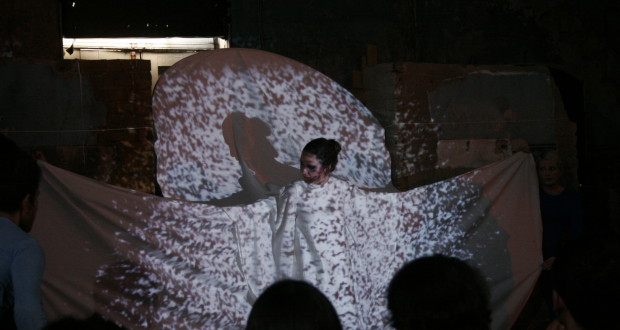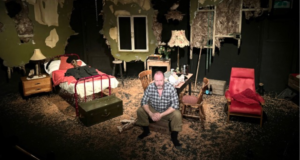Pros: The team picked a venue to match the nature of the shows and evening.
Cons: I had difficulty picking up the lines of two of the stories and, being left somewhat confused, had to work it out myself. A show where the future of English Opera is clear. A well-produced evening with talented singers but there were a few niggles felt by yours truly.
Summary
Rating
Good
Hidden in south London lies a wonderful 19th century court. Simple houses, originally almshouses for retired pub-landlords, encompass three sides of a quad and centre stage is a wonderful yet dilapidated chapel. On this particular evening this chapel is the theatre for Gestalt Arts; a group of young opera-makers producing new and modern operatic pieces.
I am always excited to see different spaces being used for theatre and abandoned places such as this chapel shout out for adventurous production companies to utilise them. Of course, disregarding a real theatre does often come with a price – namely an effective backstage area and changing room. I’ve seen it time and again, some magic of the theatre is lost when you’re able to witness the backstage mechanics. Nevertheless in this case Gestalt made a good attempt at keeping these events to a minimum and I was impressed with the relative smooth running of the show.
During the evening I was introduced to three 15-minute long new operas: A Sign in Space, Clive and Adrift, all performed in English. Gestalt Arts wish to encourage creativity and individualism and each piece revealed very different thought processes from their respective artistic teams. What brought them together was the use of experimental music scores and a move away from the huge storylines of classic operas. However, they each possessed the ethereal spirit that often comes with opera, which worked particularly well in the venue.
A Sign in Space saw Q and K, two beings created by the Narrator at the beginning of time and space disagree about a symbol Q creates. Felicity Turner as the Narrator gave an excellent physical performance on top of her distinctive and strong voice. I did however find it hard to understand what the symbol was that Q and K were in disagreement over. Whether this was because some of the words were lost to me when sung or that the script was not that clear I’m not sure and perhaps it was a combination of both.
In Clive, the title character is trapped in a small room painted red. He is tended for by a nurse and persecuted by his sister who has a look of the devil about her. Clearly Clive has a difficult past although the full extent of it is not known. I am inclined to believe we were left in the dark about this for effect but I cannot be sure as again a number of lines weren’t clear enough. I also think the conclusion arrived rather too quickly and ultimately confused the audience.
Adrift, a piece about being left to die at sea, I feltwas the best assembled show. Not only did the performers (Maud Miller as Woman and Oliver Brignall as Man) have wonderful voices, as did the entire cast that evening, they also portrayed the emotion beautifully and projected not just the singing but also the words well.
All shows were well designed, the sets were simple with bold colours and strong lines and the costumes extravagant. I particularly liked the use of four chorus members to portray The Sea in Adrift and the Narrator’s angelic costume in A Sign in Space. I also consider the use of both ends of the chapel a good choice, as there is a lot of potential in the venue. However, since we were promised a promenade theatre, I expected more than turning my seat 180 degrees.
Overall, I thought the evening was enjoyable and well managed. Each individual aspect of the show was strong however I felt that the two more conceptual shows of A Sign in Space and Clive are more difficult to follow for a non-avid opera follower. I would like to see more from Gestalt Arts as I feel they have the potential to introduce opera to a wider audience.
Director: Ruth Mariner
Music: Nick Morrish Rarity & Tim Morrish, Ben Ashby, Ed Scolding
Text: Arthur Sawbridge, Matthew Lee Knowles and Shaun Gardiner
Producer: Ruth Mariner, with Eleanor Hemmens and Toby Young
Booking Info: Clive and other stories has now finished. For more information visit: www.gestaltarts.co.uk .
 Everything Theatre Reviews, interviews and news for theatre lovers, London and beyond
Everything Theatre Reviews, interviews and news for theatre lovers, London and beyond



